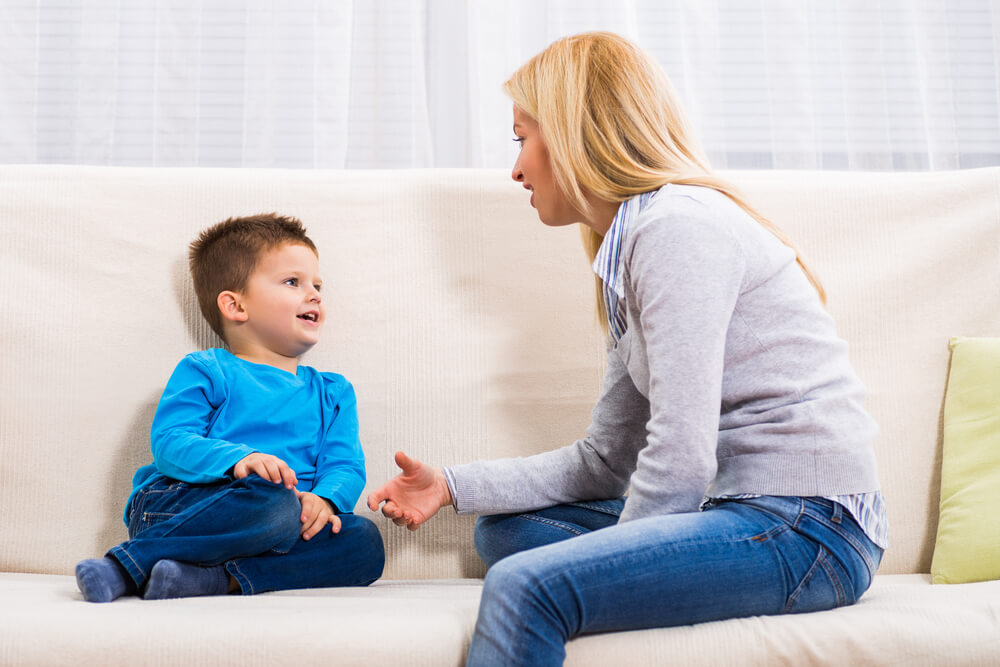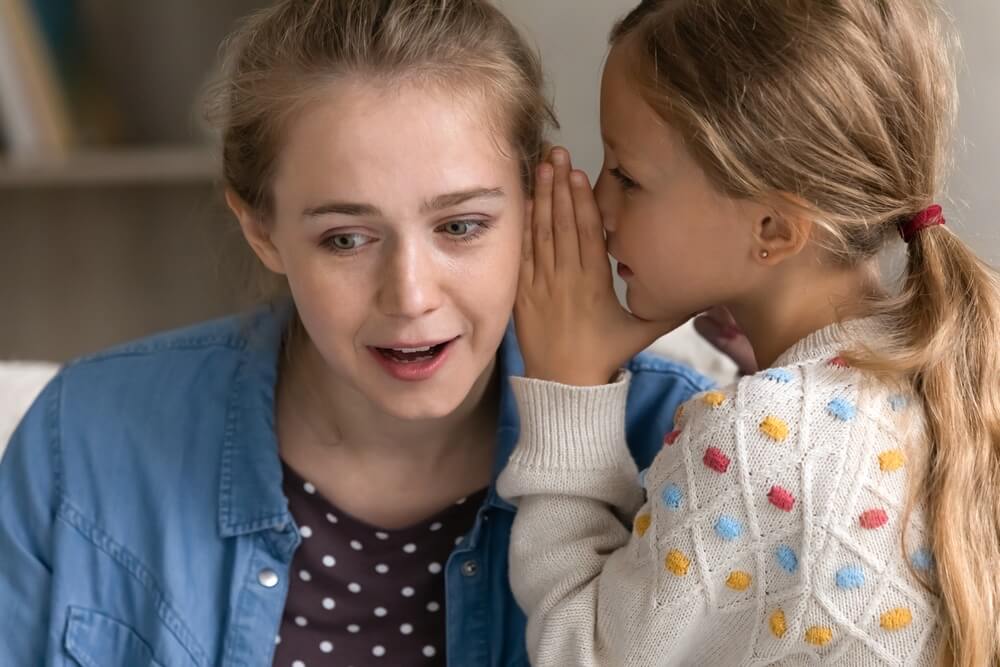How to Answer When Your Child Asks “Where Do Babies Come From?”

It’s the question that many parents dread their child asking: “Where do babies come from?” However, if you’re prepared with the answers and able to keep things light, it needn’t be a big deal. Use our guide below to help explain to your kids in an age-appropriate way how babies are made—and find out why it’s important (at the right time) to do so. We also include links to a range of handy resources to support the conversation.
Contents:
- Why Do Kids Ask How Are Babies Made?
- Why is it Important to Answer the Question?
- At What Age is a Child Most Likely to Ask this Question?
- How Do I Know if My Child is Ready for the Answers?
- How to Explain “Where Do Babies Come From” to Kids
- Tips to Make the Conversation Easier
- What if My Child Doesn’t Want to Talk About It?
- Books and Videos That Could Be Helpful
Why Do Kids Ask How Are Babies Made?
Kids are naturally curious about the world around them, meaning this question will naturally crop up at some point in their young lives. There’s a good chance that it could be prompted if you or your partner become pregnant or if one of your friends has recently had a baby. Seeing infant animals, such as puppies, lambs, or chicks, could also be the catalyst for the query.
Why is it Important to Answer the Question?

InesBazdar/Shutterstock.com
Answering questions about how babies are made is really important. Dismissing your child’s questions, or reacting in a shocked manner, may make your little one feel embarrassed or even ashamed and lead them to believe they’ve asked something inappropriate or bad. Further, if your child doesn’t get the answers they need from you, they’re likely to seek them elsewhere, which could lead to them receiving misinformation.
Plus, talking to your child about sex and where babies come from early means that there won’t be as much ground to cover as compared to waiting until they’re older. In fact, it can actually be easier to discuss this subject with younger kids, as they don’t tend to require as much in-depth info as an older child.
By having an open and honest attitude to questions your child poses about sex and babies, you’ll be laying a strong foundation for future discussions and help to ensure they come to you if they need answers or have concerns.
At What Age is a Child Most Likely to Ask this Question?

fizkes/Shutterstock.com
This will vary—some children may ask the question around the age of three, while others won’t ask until a few years later: there’s no ‘normal’ when it comes to this.
If your child gets to the age of around seven or eight and hasn’t raised the subject, and you’re concerned that they could be hearing things in the playground on the subject, then you may want to ask (in a relaxed manner) what they know about how babies are made or introduce a book designed to give kids age-appropriate information about sex, conception, and birth.
Follow your instincts: you know your child best and what they’re ready to handle.
How Do I Know if My Child is Ready for the Answers?

fizkes/Shutterstock.com
You know your child better than anyone else, so be guided by your intuition. If they’ve asked a question about where babies come from, then it’s important to address this, even if they’re very young. Keep things age-appropriate and simple. For older children, you may wish to give a more ‘technical’ explanation, possibly with the help of a book or video.
With younger children especially, it’s important to be careful of the language you use, to avoid inadvertently alarming them. For example, when talking about birth, it could be best to avoid describing it as being very painful; instead, opt for something like ‘hard work’.
Kids of around three or four years old are likely to ask a single, straightforward question, such as where they came from, or how they got in your tummy. Providing a snippet of information at a time is a good way to gradually, over time, build up their picture of how babies are made.
It is important to ensure that your child is aware of the basics before starting puberty, so they’re prepared for the changes that will happen to their body and aren’t alarmed by them. It’s especially vital to make sure that girls are ready for their first period so that they know what it means and what to do when it arrives.
How to Explain “Where Do Babies Come From” to Kids

Prostock-studio/Shutterstock.com
This will depend on two key things: how old your child is and what they already know. Listen carefully to what your child is asking, and try not to make it a ‘big deal.’ Find out what they already know by asking a few simple questions to get an idea of their thoughts on the subject.
For toddlers and pre-schoolers, their questions may just be centered on how, if you’re pregnant, the baby got into your tummy and whether, for example, it can hear your voice. You may wish to explain in simple terms that a baby grows from a sperm and an egg, just like a plant grows from a seed. Be led by your child, and aim to answer their questions openly but in a way that reflects their age and understanding.
Older children may have more specific questions about sex or the mechanics of how a baby is born. Again, be led by your child—if they’re school age, this could be a good point at which to bring in more anatomical terms, such as uterus instead of tummy. When it comes to speaking about sex, older children could have more in-depth questions. You may want to explain (again, in simple terms) that this is the process whereby sperm is deposited into a vagina by a penis, which can sometimes lead to making a baby.
There are lots of books, videos, and other resources that you could introduce to help you explain how babies are made to your child, and we cover some of these below.
How to Answer the “How Does the Baby Get Out?” Question
This may be one of the main (or only!) questions a young child will have, especially if they ask about your pregnancy. It can be tricky to figure out how to answer this, but—again—keeping it simple is the key.
So, you could explain that babies usually come out from between the mom’s legs (or the vagina) but that occasionally, a doctor may need to make a special cut in the mom’s tummy to get the baby out.
Tips to Make the Conversation Easier

Evgeny Atamanenko/Shutterstock.com
First off—take a deep breath and relax! Although this is a conversation that many people dread having with their children, approaching the subject in a relaxed and open way is likely to make it much easier than you anticipate. Use these tips to help things go even more smoothly:
- Use answers that are short and to the point.
- Deploy words that your child understands and uses.
- There’s no need to rush: it’s ok to tell your child that you need a little more time to find the best answer so that you can seek out a book to help if needed.
- Be as honest as possible while remaining age-appropriate.
- Keep the conversation open once you’ve given an answer if you think your child wants to continue the discussion or has more questions.
- If you want to introduce the subject to older kids, you may wish to use the plot of a tv show or movie you’re watching together as a springboard to start a discussion.
- Keep the tone casual.
- Trust your instincts.
Related: Nudity at Home: Is it Okay to be Naked at Home Around Your Kids?.
What if My Child Doesn’t Want to Talk About It?

Fizkes/Shutterstock.com
If your child is a little older and you’d like to have the’ how babies are made’ conversation with them and are simply met with eye-rolling when you try to bring it up, you may wonder how best to proceed.
If your kid is at the tween or teen stage, a good approach is often to find moments to get a discussion going when you’re doing something else together, such as carrying out a chore, shopping, or while in the car. This can take off some of the pressure and help your child (and you!) feel less self-conscious about things.
Some parents find it helpful to share some of their own experiences—a first kiss, for example, or a school crush—with their child. As well as being a way to strike up a conversation about the subject, it can also demonstrate that you understand exactly what they’re going through. It’s often difficult for kids to remember that even their parents were young once!
Books and Videos That Could Be Helpful

AnikonaAnn/Shutterstock.com
Where Do Babies Come From? by Dr. Jillian Roberts
This is a great book for kids aged three to five years old. Read together with your child to help tell them the answers to the questions they have about how babies are made. The book has a handy question-and-answer format and offers additional questions at the back should your child want more information.
Where Do Babies Come From? Board Book by Katie Daynes
Created for children of four years and older, this beautiful board book features lots of flaps that little kids will love lifting to discover where babies come from—both of human and animal kind! Age appropriate and gorgeously illustrated, this is a great introduction to the subject for younger children.
It’s So Amazing! by Robie H. Harris
Perfect for kids aged seven to ten years old, this updated version of the classic book offers a great opportunity to talk together with your child about where babies come from. With its honest, reassuring, age-appropriate words and accurate, inclusive illustrations, It’s So Amazing covers pregnancy, birth, adoption, OK and not-OK touches, gender identity, families, and more.
The Girl’s Body Book by Kelli Dunham
Now in its fifth edition, this popular book is packed with information that girls need to help them navigate the challenges and changes of puberty. Aimed at pre-teens, it covers everything from peer pressure to periods and contains lots of tips and advice on issues including self-confidence, personal hygiene, mindfulness, and lots more.
Operation Ouch! How are Babies Made? | BBC Video
This video from the BBC, designed for kids of about seven to eleven years old, gives children an overview of sex and how an egg is fertilized. Accessible and fun, it’s also a great jumping-off point for further discussions.
Sex Education Videos | Sex Ed Rescue
Looking for a comprehensive set of video resources to help guide you through talking to your kids about the birds and the bees? This collection includes short videos for both children and parents and covers the basics as well as subjects including staying safe online and how parents can best protect their kids from sexual abuse.
⠀
While speaking about where babies come from with your kids may feel daunting, keeping things open, honest, and simple is likely to make the conversation much easier. Giving your child the information they need in the right way can help ensure that you can continue to have open discussions on the subject and that they’ll come to you in the future with any concerns. It’s a great opportunity, too, to help them develop a healthy attitude to sex and relationships.
Hopefully, the guide above will help you navigate the “how are babies made” discussion—but we’d love to hear your tips if you’ve been through it and come out the other side. Drop us a line in the comments below to tell us how you broached the subject and what worked for your family!
The picture on the front page: Evgeny Atamanenko/Shutterstock.com
Проверьте электронный ящик



















